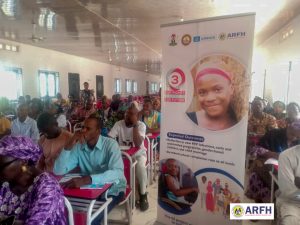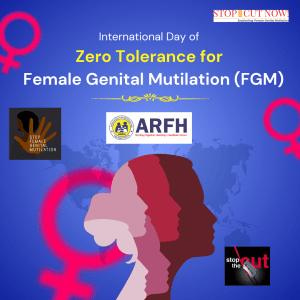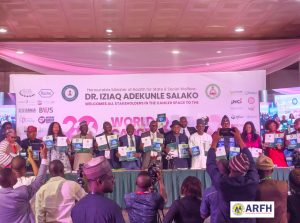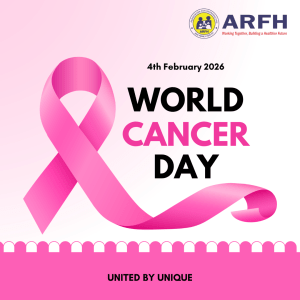The end of project meeting of the Community Based Distribution Component of the Expanded Social Marketing Project in Nigeria (ESMPIN) was held in Kaduna on April 1st 2017, to present the end of project achievements and lessons learnt.
 ESMPIN is a 6-year project funded by the United States Agency for International Development (USAID), in which different organisations implemented different components. ESMPIN is the largest family planning project in Nigeria.
ESMPIN is a 6-year project funded by the United States Agency for International Development (USAID), in which different organisations implemented different components. ESMPIN is the largest family planning project in Nigeria.
Through ESMPIN, the Society for Family Health, in collaboration with Population Service International (PSI), BBC Media Action and Association for Reproductive and Family Health (ARFH), aimed to expand access to Child spacing and improve child survival in Nigeria through the private sector market.
 ARFH implemented the Community Based Distribution (CBD) component of ESMPIN that involves distribution of Child Spacing and Child protection/survival products in four norther Nigeria states.
ARFH implemented the Community Based Distribution (CBD) component of ESMPIN that involves distribution of Child Spacing and Child protection/survival products in four norther Nigeria states.
ARFH in collaboration with 8 Community Based Organisations in Jigawa (SWODEN & VILDEV), Katsina (FAHYE & SWODEN), Kebbi (YAON, YOREHN) and Zamfara (CENCEX & MDC); working with more than 2,000 Community Based Distribution Agents (CBDAs) recorded significant achievements in improving uptake of family planning/child spacing products (condoms, combination3 contraceptive pills) and child protection products (PUR, ORS, zinc, water guard) which protect children from diarrhoea and other water borne diseases.
 Some of the products where distributed free at certain events, but the plan of the project was for the CBDAs to sell these products at subsidised rates, so that there will always be available in hard to reach areas and the agents will have income to sustain the distribution long after the project has ended.
Some of the products where distributed free at certain events, but the plan of the project was for the CBDAs to sell these products at subsidised rates, so that there will always be available in hard to reach areas and the agents will have income to sustain the distribution long after the project has ended.

 In these states, the project was able to increase the Contraceptive Prevalence Rate, ante-natal care visits by pregnant women, child spacing, maternal, neonatal and child health, awareness about family and child protection products and strategies.
In these states, the project was able to increase the Contraceptive Prevalence Rate, ante-natal care visits by pregnant women, child spacing, maternal, neonatal and child health, awareness about family and child protection products and strategies.

 The Project Manager of ESMPIN in ARFH, Aliyu Guraguri said: “the end-line evaluation was conducted and it shows that the CBD component has really done well in terms of increasing access to child spacing and child survival commodities. It was also successful with regards to engagement of government, religious and traditional leaders/institutions”.
The Project Manager of ESMPIN in ARFH, Aliyu Guraguri said: “the end-line evaluation was conducted and it shows that the CBD component has really done well in terms of increasing access to child spacing and child survival commodities. It was also successful with regards to engagement of government, religious and traditional leaders/institutions”.
Aliyu Guraguri reiterated that ESMPIN CBD component was evaluated as successful in terms of sustainability, as the CBDAs have been able to form strong networks across 64 LGAs in the 4 states.
“I thank the funders USAID, the management of ARFH, the staff of the community based organisations, the community based distribution agents, the community leaders that created enabling environments and government officials and community members for all their efforts that led to the success of the community based distribution component of ESMPIN”, said Guraguri.
 The State Programme Officers (SPOs) and Executive Directors of the CBOs expressed their gratitude to ARFH and USAID for the project. Hajiya Aisha Halliru, State Programme Officer, Jigawa State said: “ARFH is the best organisation I have worked for and the ESMPIN Project is the best project I have been part of in my many years as a development practitioner”.
The State Programme Officers (SPOs) and Executive Directors of the CBOs expressed their gratitude to ARFH and USAID for the project. Hajiya Aisha Halliru, State Programme Officer, Jigawa State said: “ARFH is the best organisation I have worked for and the ESMPIN Project is the best project I have been part of in my many years as a development practitioner”.
In a special way, we thank the staff of ARFH for building our capacity and for ensuring the seamless implementation of the project all through these past few years.
The representative of the President/CEO of the Association for Reproductive and Family Health (ARFH), Mr Adeyemi Oladeji (Coordinator, ARFH HIV Project) said that ARFH is grateful to all the partners and community based organisations and distribution agents who worked very hard in difficult terrains to see to the success of the project.
 Adeyemi Oladeji said: “we thank you all and we believe that your capacity that we have built will enable you soar in your different careers and succeed in subsequent projects your organisations embark upon”. He reiterated that the amount of work put into the planning of the project was enormous but the strong will of the implementing partners and staff of the project led to the successes.
Adeyemi Oladeji said: “we thank you all and we believe that your capacity that we have built will enable you soar in your different careers and succeed in subsequent projects your organisations embark upon”. He reiterated that the amount of work put into the planning of the project was enormous but the strong will of the implementing partners and staff of the project led to the successes.
“We hope that you stay in touch with ARFH and with all the Community Based Distribution Agents so that they can be involved in subsequent projects of various organisations and consortiums towards achieving sustainable development in under-served communities”, he said.


The success stories told by beneficiaries in several communities where the project was implemented include: reduction of the frequency of births for many women (which was yearly before), reduction in the mortality rates of mothers and children, improvement of the health of child-bearing women, and increase in the survival of babies due to adequate spacing and use of child survival products acquired.




